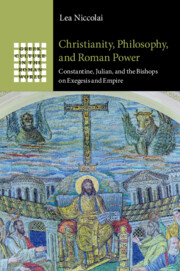 Christianity, Philosophy, and Roman Power
Christianity, Philosophy, and Roman Power Published online by Cambridge University Press: 07 July 2023
During the Principate, the negotiation of the ruler’s intellectual authority emerged as a key strategy of political self-legitimisation. In the early fourth century, the definition of early Christian thinking as the perfect system of knowledge, which had been developed through dialogue and rivalry with the post-Hellenistic philosophical schools, encouraged the emperor Constantine to mobilise his allegiance to Christianity for competitive self-assertion: he upheld his conversion as an intellectual achievement with no imperial precedent. Modern reluctance to take ancient definitions of Christianity as philosophy at face value has obscured the force of this propagandistic argument. Yet its recovery is essential to understanding Julian’s philosophical response to the positioning of early Christianity as an authoritative system of knowledge and appreciating the strategies of self-legitimisation pursued by fourth-century bishops in conversation with the (Christian) philosopher-ruler. As the question of who holds authoritative knowledge was antagonised by religious disputes, the fourth-century socio-political and ideological transition was channelled into a ‘politics of interpretation’ in which leaders (imperial and episcopal) negotiated their status as intelligent decoders of providential signs scattered throughout literature, history, and the cosmos.
To save this book to your Kindle, first ensure no-reply@cambridge.org is added to your Approved Personal Document E-mail List under your Personal Document Settings on the Manage Your Content and Devices page of your Amazon account. Then enter the ‘name’ part of your Kindle email address below. Find out more about saving to your Kindle.
Note you can select to save to either the @free.kindle.com or @kindle.com variations. ‘@free.kindle.com’ emails are free but can only be saved to your device when it is connected to wi-fi. ‘@kindle.com’ emails can be delivered even when you are not connected to wi-fi, but note that service fees apply.
Find out more about the Kindle Personal Document Service.
To save content items to your account, please confirm that you agree to abide by our usage policies. If this is the first time you use this feature, you will be asked to authorise Cambridge Core to connect with your account. Find out more about saving content to Dropbox.
To save content items to your account, please confirm that you agree to abide by our usage policies. If this is the first time you use this feature, you will be asked to authorise Cambridge Core to connect with your account. Find out more about saving content to Google Drive.